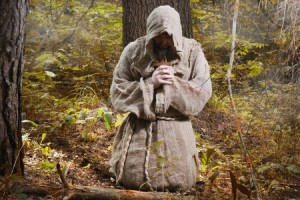Turning to God in Repentance

In The Confessions, Augustine famously prayed as a young man of nineteen for God to grant him the gift of chastity, “but not yet.” Augustine said he was afraid that God would deliver him from lust too quickly, “which I desired to have satisfied rather than extinguished.” God “granted” his prayer and it wasn’t for another twelve years that Augustine finally converted to Christianity. In the meantime, he fathered a child by a mistress and spent a few years within the heretical sect of Manichaeism. What seems to have been missing for him at the time was a turning to God in true repentance.
In The Doctrine of Repentance, Thomas Watson said: “Repentance is a grace of God’s Spirit whereby a sinner is inwardly humbled and visibly reformed.” He went on to discuss what he described as a recipe with six special ingredients for true repentance: 1) the sight of sin; 2) the sorrow for sin; 3) the confession of sin; 4) shame for sin; 5) hatred for sin; and 6) turning from sin. He warned that if any one of them was left out, “repentance loses its virtue.”
So far we’ve looked at the first three ingredients in “On the Road to True Repentance” and “Confession and True Repentance.” We’ve also seen what Watson thought about “Counterfeit Repentance.” Here we will look at the last three ingredients, with special emphasis on turning from sin.
Watson said it was a great shame not to be ashamed of our sin. If the sins of the godly are mentioned at all on Judgment Day, it will not be to shame them, but to show the riches of God’s grace in pardoning them. Shame for sin is the shame of realizing we were like beasts when we sinned—dogs that returned to their vomit; or pigs wallowing in the mud after they were washed (2 Peter 2:22). “God’s image is defaced, reason is eclipsed, and conscience is stupefied.”
“A true penitent is a sin-loather.” Their spirit is set against it. They hate all sin, for “sin leaves a stain upon the soul.” If you love sin instead of hating it, you are far from repentance. “To the godly, sin is a thorn in the eye; to the wicked, it is a crown on the head.” Sin reaches our soul. By sin we have lost our innocence. Our hatred of sin should be infinitely greater than our love for it ever was. Clearly Augustine at nineteen did not hate lust more than he loved it. He also did not turn from it.
In true repentance, we recognize our sin; we sorrow for our sin; we confess our sin; we are ashamed of our sin; and we hate our sin. These then lead us to the final ingredient: turning from sin. The day we turn from sin, we must commit to a perpetual fast from sin—“Dying to sin is the life of repentance.” Turning from sin should be so visible, that others see it. It’s as if another soul has lodged in the same body.
Our turning must include our hearts—not just our behavior. “The heart is what the devil strives hardest for.” Every sin is to be abandoned; every lust is to be destroyed. “Someone who indulges one sin is a traitorous hypocrite.” An individual may restrain from sin out of fear or design, but a true penitent does so because of their love for God. If sin were not such bitter fruit, if death were not it consequence, “a gracious soul would forsake it out of love for God.”
Turning from sin means a turning to God. “Unsound hearts pretend to leave old sins, but they do not turn to God or embrace his service.” True turning from sin means there is no returning. Returning to sin gives the devil more power than before. “A true turning from sin means divorcing it, so as never to come near it any more.”
Some people are only half-turned—they turn in their judgment, but not in their practice. They acknowledge the power of sin over them, and even weep over it. But they are “so bewitched by it that they have no power to leave it.” In this sense, they are powerless over it; the corruption of their sin is stronger than their convictions. Others are half-turned when they turn from many sins, but remained unturned from some special sin.
“If we turn to God, he will turn to us. He will turn his anger from us, and turn his face to us. It was David’s prayer, “O turn to me, and have mercy upon me” (Ps. 86.16). Our turning will make God turn: “Turn to me, says the Lord, and I will turn to you” (Zech. 1.3). The one who was an enemy will turn to be our friend.”
It could be that at nineteen, Augustine was only half-turned from lust. Through the graciousness of God, he did not remain half-turned, but became one of the most learned and important of the church’s theologians. Within his Book of Meditations, he wrote a “Prayer for the Gift of Tears,” asking that God would take from him whatever “offends the eyes of Thy goodness.” God alone can renew what is ruined and fallen. Augustine prayed that God would pour into his heart the fullness of His love, so that he would not think of or desire what was carnal or earthly. “But rather love Thee alone.” This was a full turning to God.



